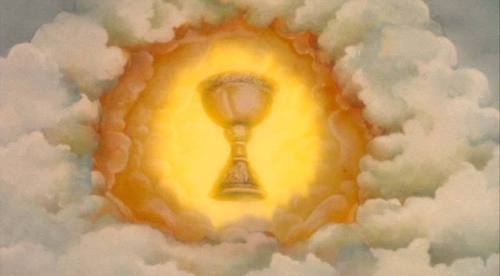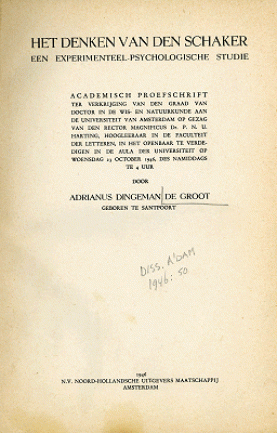Paul A. Kirschner & Mirjam Neelen
‘Armenia makes chess compulsory in schools’, according to this article in the Guardian. Armenian authorities claim that chess is the key to success in school and life. By playing chess, children not only learn how to think creatively and strategically, they also get better at solving problems and become more intelligent. Even better (notice the slightly sarcastic tone here), this creativity, problem-solving, and other similar good stuff, isn’t just specific for chess. The promise is, that it will generalise to other subjects AND to life in general (near and far transfer). In other words, chess seems to be the holy grail!
What the Armenian authorities actually claim is that learning how to play chess on the one hand is the key to developing generic skills (in particular problem-solving) and on the other hand is a vital element when it comes to generic traits, such as emotional stability, intellect, memory, watchfulness, and far and foremost creativity. Let’s explore both generic skills and traits to unravel what it is we’re talking about.
Generic skills
A skill (Merriam Webster) is the ability to use one’s knowledge effectively and readily in execution or performance. In this definition lies the crux of the matter: To be able to do something well, you first need domain-specific knowledge in the domain at hand (i.e., use one’s knowledge effectively and readily). Skills are, in other words, always domain-specific. Without biology knowledge, you can’t be skilful in biology. Despite this, it’s quite trendy to talk about generic skills, also called domain-independent skills. Examples are problem-solving, time management, collaboration, leadership, writing, and so forth.
Now, the problem is that it’s impossible to solve a problem in a domain, in which you don’t have any knowledge, except in the rare cases of either serendipity or chance/luck. The same goes for time management. You can’t manage your time on a task or project properly if you don’t know what this task or project actually involves. Yes, you can learn procedures to manage your time or solve a problem, but that’s not the same thing as a skill; in fact what it is, is acquiring procedural knowledge. For example, you can learn the steps that are part of solving a problem (e.g., orient, analyse, plan, calculate outcome, process control, evaluation, though these too are often in a domain!) or you can learn the steps involved in writing or that are parts of an article (e.g., title, abstract, introduction, methods, data processing, results, conclusion, discussion). However, knowing what the steps are, even if you have carried them out in one domain, doesn’t mean you’re capable. It means that you can apply that procedural knowledge. Period. Strategies and tactics – just to look at the matter from the chess perspective again – are also domain specific; they don’t work with checkers, go, bridge, Parcheesi, tic-tac-toe (you get the point); nor will they work in life in general.
Etch it in your brain:
General, domain independent skills don’t exist; ONLY domain-specific ones.
General traits, particularly creativity
First and foremost, creativity is NOT a skill. Creativity is an individual characteristic or trait. Charles Reigeluth (1983, p. 32) argues that: “Traits are student characteristics that are relatively constant over time…whereas states are student characteristics that tend to vary during individual learning experiences, such as level of content-specific knowledge.”
As such, creativity can’t be taught and is very difficult to influence. The only thing one can do, is to create a learning climate in which people feel psychologically safe; in which people feel safe enough to do or say things that might not be fully correct of that might sound awkward or even ‘stupid’ to others. In other words, an environment in which people feel safe enough to take risks.
Memory is also a trait of a person. This doesn’t mean you can’t train or change it; it just means that it will take a lot of time, effort, and very purposeful training. It can’t be learned ‘incidentally’ through something like chess.
For example, in the context of the Armenian claims around chess and creativity, it would be possible, if the chess teacher would create such a safe learning climate, that one or more children learn how to play chess creatively. However, and this is key, the foundation will always be domain-specific (chess!) knowledge (moves, tactics, strategies) and skills (through applying the knowledge over and over again in practice session and matches. This fact has been known since 1946 when A.D. de Groot got his PhD and produced the thesis (here in Dutch and see image below 😊) and later translated into English as “Thought And Choice In Chess”.
Also, although we confess that we’re not fans of him when it comes to learning, Sir Ken Robinson defines creativity strikingly as …the process of having / coming up with original ideas that have value. The key word here is value.

Without knowledge and skills it’s impossible (with the exception of a fluke) to come up with something that has value. Just for fun, try to come up with a creative and valuable solution for a chess problem if you’ve never learned how to play chess. Or, try, if you don’t know anything about soccer or can’t play it, to come up with a creative solution to break through a stubborn defence. Good luck!
In addition to the article in The Guardian, there’s also a report written by Ruben Aghuzumtsyan en Sona Poghosyan, titled The impact of chess lessons on formation and development of the students (2014). It was presented at the International Conference on Chess in Schools, which also had presentations limited to the top scientific countries of Angola, Cameroon, China, Laos, Madagaskar, Malawi, Mongolia, Thailand, the USA, and Zambia. According to the report, chess in schools leads to more creativity, an increase of general intelligence, better visual memory, better logical reasoning, better attention spans, and higher scores in maths. In sum, again, chess as the holy grail.

There are a couple of problems with the report, namely:
- The research hasn’t been published in an accepted scientific journal anywhere. What this means is that there hasn’t been any peer review and the quality can’t be guaranteed.
- The researchers are neither independent nor unbiased. Their research institute is affiliated with the Chess Federation of Armenia and the Chess Academy of Armenia. The research is also (partly) paid for by these two bodies. This, to say the least, makes the research prone to a ‘conflict of interest’. Who doesn’t remember the ‘research’ that has been done in relation to the effects of sugary fizzy drinks on people’s health, which was financed by….Coca Cola (see for example this article in the Telegraph)! According to the researchers there is no doubt whatsoever that chess in education plays a major role in student development. They therefore claim that teachers should teach the ‘beauty and wisdom’ of chess and they also state that chess is their ‘national proud and heritage’. We seriously doubt that we’re dealing with unbiased researchers here.

- The research didn’t conduct any blind (let alone double blind) analysis. In other words, the judgment of students with regards to creativity, logical reasoning, etcetera, was conducted while knowing which students played chess and which students didn’t. And oh, just a detail, the evaluation was done by…their chess teachers (right!).
- The report doesn’t explain how they selected the study participants and neither does it describe whether participants had been randomly allocated to the intervention (so it’s fair to assume the answer is no). As a consequence, there’s no way to know if the selection had an effect on the results.
- The authors don’t share anything about the instruments that they used to measure the effects and hence, we don’t know anything about their validity and reliability.
- All the results in the report are ‘correlational’. Everything correlates to everything (!!) and it’s impossible that we’re dealing with causality here. The results also show that the biggest distinguishing factor is general intelligence and NOT chess.

Aghuzumtsyan and Poghosyan conclude “Summing up the results of all steps we can say that teaching of chess in schools affects the development of mental qualities such as intelligence, creativity, memory, attention, watchfulness, logical thinking, emotional stability and will. All of this, once again prove the importance and the role of Chess in schools as a tool of effective and strategic management of education and formation of the modern individual (p 7).” The Holy Grail! Hallelujah and Amen!!
What does other research tell us?
We’ll start by quoting Campitelli and Gobet (2008, p. 139), who conducted a critical review on chess lessons in education. They state that “research in psychology and education suggests that cognitive skills do not transfer well from one domain to another…Do the empirical data on chess research refute this position? Unfortunately, the answer is: no”.
Sala, Foley, and Gobet, in another review (2017) conclude that, if there’s an effect of learning chess on other things, then only, short-term (!) in arithmetic and maths in elementary education and secondary education.
All this leaves us to conclude that there are two main problems when it comes to this kind of (or any other) ‘holy grail’.

The first problem is that the proponents promote all this nonsense but worse, others believe the drivel and even implement the snake oil without even thinking twice! The second problem is – and we also see this when it comes to Latin (well, in the past), then Maths, and today it’s mostly coding and computational thinking….it all sounds too good to be true.
Let’s just all keep these wise words from Daniel Willingham (2012) in mind: If it sounds too good to be true, it probably is!
Let’s throw out the idea of any holy grail and be more aware of potential snake oil. Just play chess for the sake of enjoying playing chess! And that’s that.
References
Aghuzumtsyan, R. & Poghosyan, S. (2014). The impact of chess lessons on formation and development of the students. Retrieved from http://www.iccs.chessacademy.am/uploads/images/h_impact_of_chess_lessons_on_formation_and_development_of_the_students-article.pdf
Campitelli, G., & Gobet, F. (2008). The role of practice in chess: A longitudinal study. Learning and individual differences, 18(4), 446-458. Retrieved from https://www.researchgate.net/profile/Fernand_Gobet/publication/233809021_Campitelli-Gobet_LID08_TheRoleOfPracticeInChess-ALongitudinalStudy/links/09e4150bb9ac09fbce000000.pdf
Groot, A. D. de (1946). Het denken van den schaker. Amsterdam, The Netherlands: Noord-Hollandsche Uitgevers Maatschappij.
Groot, A. D. de (1965). Thought and choice in chess. The Hague, The Netherlands: Mouton
Reigeluth, C. M. (Ed.) (1983). Instructional-design theories and models: An overview of their current status. Hillsdale, NJ: Erlbaum Associates.
Sala, G., Foley, J. P., & Gobet, F. (2017). The Effects of Chess Instruction on Pupils’ Cognitive and Academic Skills: State of the Art and Theoretical Challenges. Frontiers in psychology, 8, 238.
Willingham, D. T. (2012). When can you trust the experts? How to tell good science from bad in education. San Francisco, CA: Jossey-Bass.





Sala and Gobet (2017) have also published
Does Far Transfer Exist? Negative Evidence From Chess, Music, and Working Memory Training
Giovanni Sala, Fernand Gobet
http://journals.sagepub.com/doi/full/10.1177/0963721417712760
LikeLike
Your case is very strong of course, but since the Guardian article you are referring to is 7 years old it would have been more than a little interesting to ask someone at the Armenian ministry of education how the initiative actually went.
LikeLike
Just did a radio interview on this with two people (journalist, teacher) and it’s still the case. The research I reported on is recent and not 7 years old. Also the research is POOR.
LikeLike
Thank you. You’ll be interested to see this: ‘a new chess scientific research institute, due to open in Yerevan later this year, where scientists and psychologists will research the impact of chess in the learning process’. Did your interviewees mention this?
http://www.bbc.co.uk/news/stories-43084816
LikeLike
Reblogged this on From experience to meaning….
LikeLike
Reblogged this on kadir kozan.
LikeLike